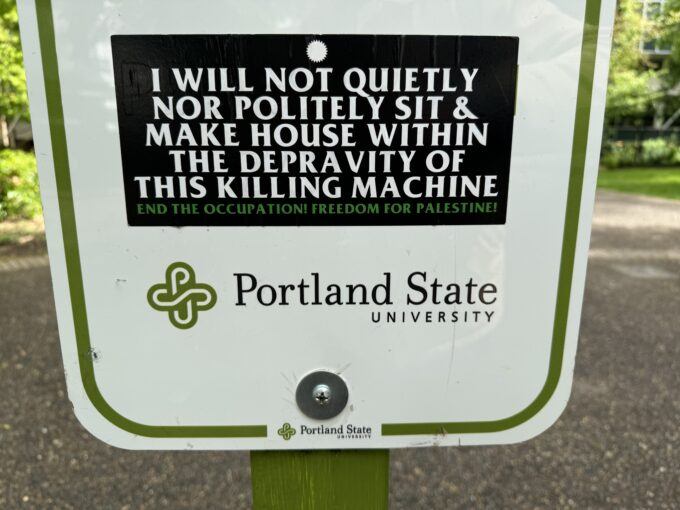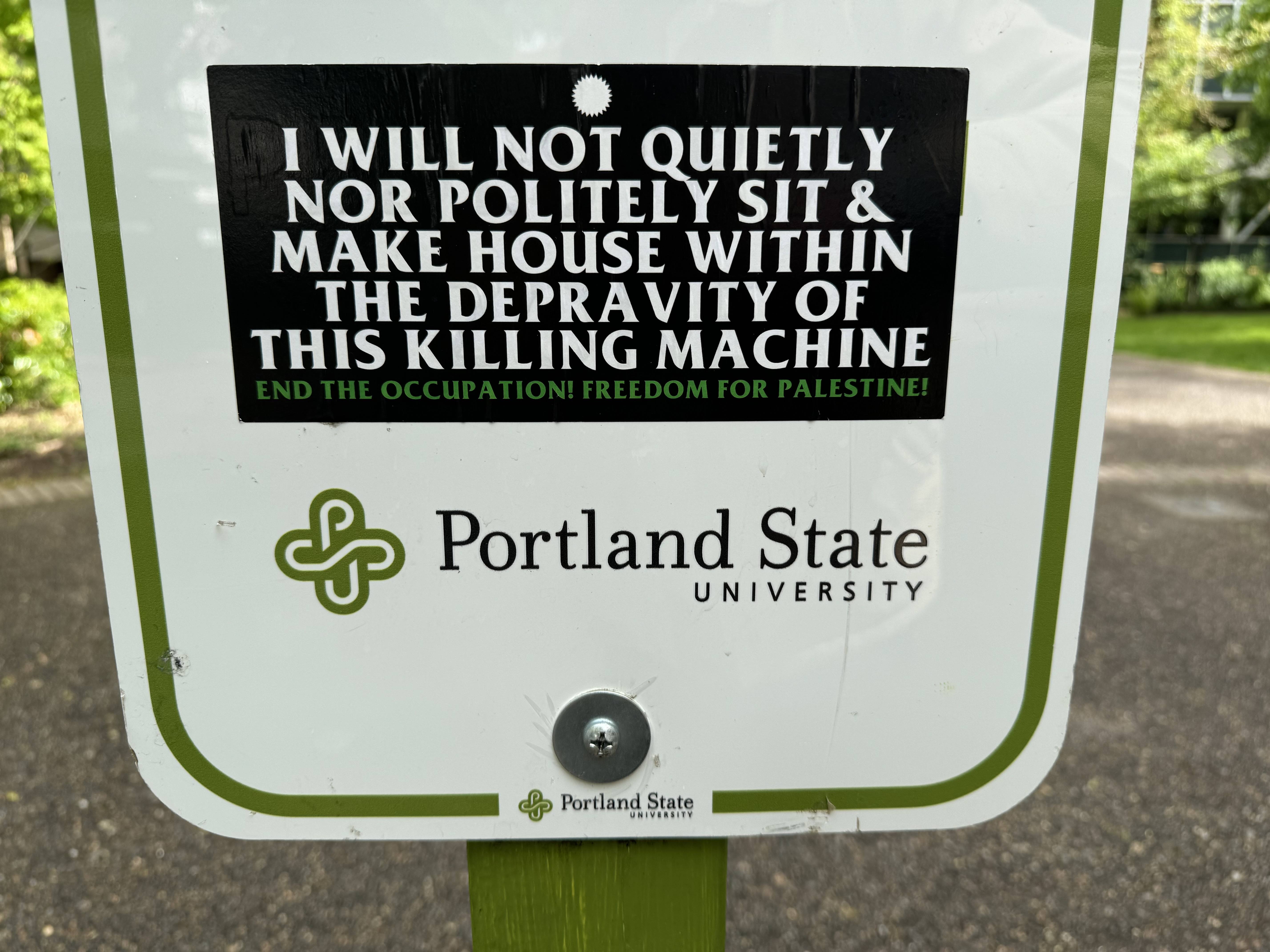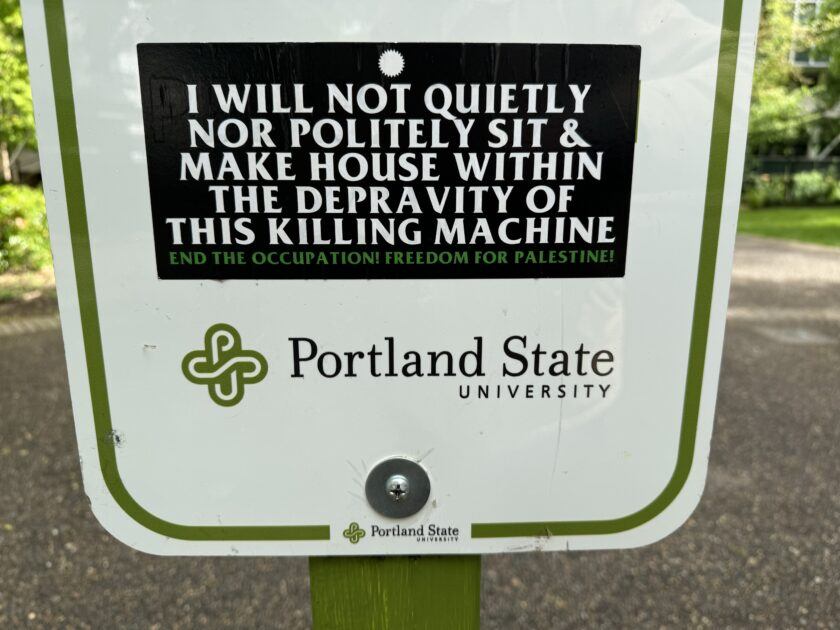






























































Photograph by Nathaniel St. Clair
One of the small ironies of the Vietnam era was that people who saw themselves as fervent patriots often sported pins and bumper stickers repudiating the First Amendment. That’s the constitutional amendment, as not everyone seems to know, that protects five key freedoms: speech, religion, the press, assembly, and petition. What did those pins and bumper stickers say? America: Love It or Leave It.
That message was aimed chiefly at critics of the Vietnam War. To tell peace activists to shut up or get out implicitly equated the warmongering policies of the Kennedy, Johnson, and Nixon administrations with “America.” It was a crude rhetorical tactic that was nonetheless effective because it drew strength from undercurrents of nationalism (we must stick together in the face of threats from a hostile world) and U.S. exceptionalism (unlike other countries, our motives are benign; we seek only to do good). As George W. Bush put it years later, you’re either with us or against us.
But if we identify America with the best of our founding principles rather than the worst of government actions, the directive to love-it-or-leave-it appears profoundly un-American.
We have formed our political union based in part on reverence for the idea, embodied in the First Amendment, that we all have a right to speak our minds. What’s more, the freedoms protected by the First Amendment, taken together, are meant to protect expression not only about trivia but about grave matters of policy, and especially so when ordinary people publicly challenge those who have captured the reins of government. Properly respected and put to use, the First Amendment is our best bulwark against tyranny.
Even though the First Amendment has been the law of the land since the Bill of Rights was ratified in 1791, it took nearly two centuries of struggle in the courts and in the streets to achieve the freedom of speech abstractly enshrined by the Amendment. These battles were fought by labor organizers, pacifists, publishers of radical newspapers, advocates for women’s rights, advocates for racial equality, and other political dissidents. If one asks, Who won the right to protest in America?, the correct answer is “protesters.”
Taking this longer view, it’s fair to say that speech in America is freer today than when the nation was young. We have more freedom to speak our minds and more powerful technology to share our thoughts than in generations past, nostalgia for a mythical past and panic about cancel culture notwithstanding. Americans can be rightly proud of this accomplishment. When it comes to support for freedom of speech, the U.S. ranks above most other liberal democracies.
And yet there is a problem. Despite professed belief in the value of free speech, despite the legal codes that protect speech, including speech that greatly disturbs, we have failed to protect it in a crucial policy arena. This failure to live up to our ideals has a name: the Palestine exception. In this arena, as events of the past year have dramatically illustrated, it is as if we have regressed to the mindlessness of love it or leave it, and birthed a shameful new McCarthyism.
The Palestine exception refers to the prohibition of speech critical of Israel, especially of its founding ideology, Zionism, and its ongoing oppression of the Palestinian people. The behaviors, guiding doctrines, and politics of other countries are fair game for criticism. So is the U.S. government and whatever administration is currently in power. Under the First Amendment it is the right of everyone present legally in the U.S. to express such critical views, even if others are made uncomfortable.
But criticize Israel in similar ways and the pushback will be aggressive and institutional. Efforts to stifle this criticism will come not only from predictable quarters—pro-Israel lobbying groups, such as the Anti-Defamation League—but also from institutions that are supposed to protect freedom of speech: universities and branches of government. It is as if a forcefield capable of neutralizing the First Amendment has been erected around Israel. Since October 2023 this virtual forcefield, the Palestine exception, has gained strength and is now getting a further boost from the Trump administration.
This development is more ominous than pseudo-patriotic slogans on pins and bumper stickers. In a recent executive order, “Restoring Free Speech and Ending Federal Censorship,” Trump accused the federal government of trampling Americans’ free speech rights and promised to “bring back free speech to America.” But Trump does not mean to end the Palestine exception and ensure that journalists, scholars, and peace activists are fully protected when they call out Israel for practicing apartheid and genocide. Just the opposite.
What Trump wants, of course, is not to protect free speech but, as the executive order also says, to keep government regulators from opposing “misinformation,” “disinformation,” and “malinformation.” Trump and his acolytes would like the freedom to make claims contrary to science and evidence—for example, that climate change is a hoax or vaccines cause autism—without dispute by government-employed experts. The point is to muzzle scientists and other critics, especially anyone supported in part or whole by government, who use their speech rights to refute dangerous nonsense.
At the same time Trump is touting free speech, the Palestine exception is being bolstered by threats to deport anti-genocide protesters who are not U.S. citizens; to withhold federal aid from universities that do not repress pro-Palestinian speech; and to officially embrace a definition of antisemitism that includes criticism of Israel and Zionist ideology. This contradiction between praising free speech and acting to stifle it has not been stumbled into by accident; it is entirely intentional. So it is a misnomer to call it irony. It is more accurately described as a rhetorical smokescreen for authoritarianism.
One thing it can’t be called is American. Being free to speak our minds, to share our thoughts with others, even if others are unsettled by what we say, is part of what defines us as a people. If we want to save this vital piece of our political culture, we can’t allow misleaders to carve out exceptions to free speech—exceptions that shield the powerful and insulate injustice from criticism. We must be free to speak openly about the brutal behavior of all governments, including our own. To do so is to exercise our most essential freedom as Americans, and thereby oppose the un-American tyrants who would try to take it away.
The post The Palestine Exception to Free Speech is Un-American appeared first on CounterPunch.org.
This post was originally published on CounterPunch.org.